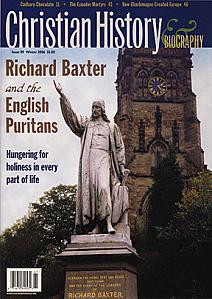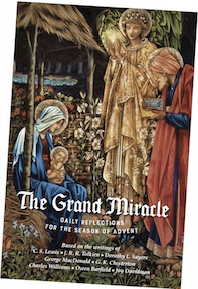Richard Baxter Born to Preach and Write
WHEN RICHARD BAXTER WAS BORN in Shropshire, England, on this day, 12 November 1615, the state of religion in England was low. In Baxter’s birth-town Eaton-Constantine, the gospel was poorly read and seldom preached. He would set a different standard when he became a pastor.
But at first that seemed far off. As a youth he was a liar and a thief consumed with pride, frivolity, and disobedience. His father had become a Christian through reading the Bible and led a more godly life than most of the pastors for miles around. He tried to guide his son to do the same.
Baxter's early schooling, however, proved not to be the best way to lead him to Christ. His schoolmasters were ministers who “read Common Prayer on Sundays and Holy Days, and taught school and tippled (drank) on the week-days, and whipped the boys, when they were drunk.” However, when Baxter was about fifteen, someone loaned his father Bunny’s Resolution, a serious call to Christian living which Baxter read. He came under the conviction of sin, began to pray, read other Christian books, and changed direction. He studied to become a pastor. About that time he also started coughing up blood, an indication of tuberculosis.
In 1641 Baxter became pastor at Kidderminster. He preached God’s Word and took care to visit each person in the town and speak to them about their sin. The transformation of the place was astounding. Bible reading, praise, and prayer replaced cursing, sexual immorality, and drunkenness. The church had to be enlarged five times. He wrote The Reformed Pastor, explaining his methods to others. In a typical sermon he said, “It is a thousand pities that when God has provided a savior for the world, and when Christ has suffered so much for their sins...that yet so many millions should everlastingly perish because they made light of their savior and salvation and prefer the vain world and their lusts before them.”
During the seventeenth century, King and Parliament went to war with each other. Kidderminster was in a Royalist county, so Baxter, who sympathized with the Puritans, was driven out. He became chaplain to parliamentary (Puritan) soldiers. However, he did not get on well with Oliver Cromwell, the leader of the Puritans.
Baxter was persecuted by both sides in the religious and political quarrels of the day and went to prison several times. Nonetheless, his one hundred and twenty eight books had a strong influence on the nation. The best-known of these was The Saints’ Everlasting Rest. It held out the hope of eternal life as a strong motivation for Christian living. Keep “heaven in your eye at all times,” he said. Another book, Call to the Unconverted, exhorted readers to turn from sin to a holy life. Its success led him to write a series of books designed to bring people to repentance and to set themselves apart for God’s use.
He and his younger wife practiced what they preached, always helping others even though they were very poor themselves. In their last imprisonment together, Baxter’s wife shared a cell with him and died first. His own death came in 1691.
—Dan Graves
---------------
Christian History magazine #89 was devoted to Richard Baxter and the English Puritans
Read an excerpt from a letter, "Baxter's Struggles"
--------------
Contemplate the story of the Incarnation day-by-day throughout the season of Advent in our latest publication, The Grand Miracle. Based on the writings of C. S. Lewis, J.R.R. Tolkien, George MacDonald, Dorothy Sayers, and others, each day’s reading offers a fresh look at the birth of Christ through the eyes of a modern author. Scripture, prayer, and full-page contemplative images complete each entry. 28 days, 64 pages. Preview the Devotional here.







